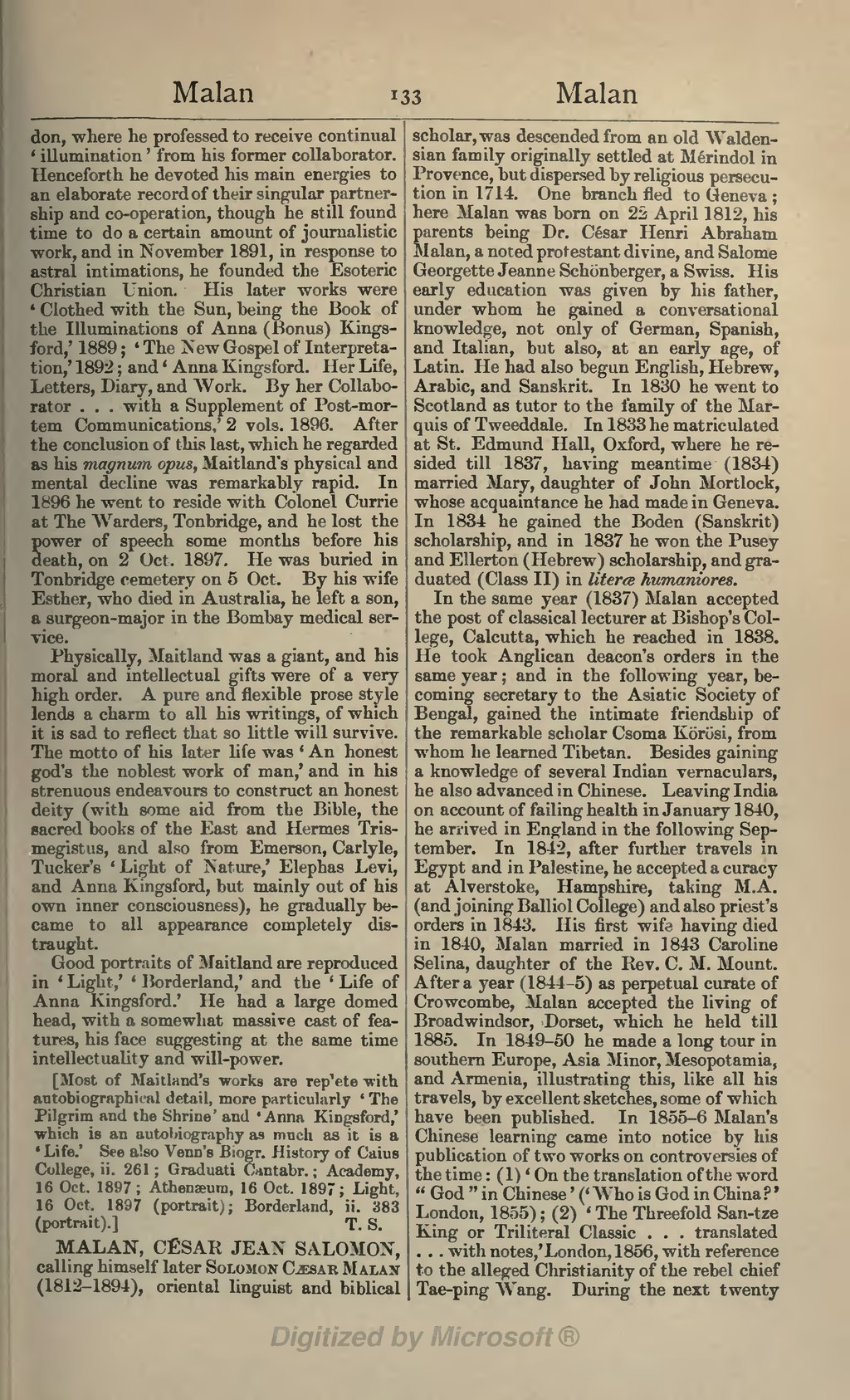don, where he professed to receive continual 'illumination' from his former collaborator. Henceforth he devoted his main energies to an elaborate record of their singular partnership and co-operation, though he still found time to do a certain amount of journalistic work, and in November 1891, in response to astral intimations, he founded the Esoteric Christian Union. His later works were 'Clothed with the Sun, being the Book of the Illuminations of Anna (Bonus) Kingsford,' 1889; 'The New Gospel of Interpretation,' 1892; and 'Anna Kingsford. Her Life, Letters, Diary, and Work. By her Collaborator . . . with a Supplement of Post-mortem Communications,' 2 vols. 1896. After the conclusion of this last, which he regarded as his magnum opus, Maitland's physical and mental decline was remarkably rapid. In 1896 he went to reside with Colonel Currie at The Warders, Tonbridge, and he lost the power of speech some months before his death, on 2 Oct. 1897. He was buried in Tonbridge cemetery on 5 Oct. By his wife Esther, who died in Australia, he left a son, a surgeon-major in the Bombay medical service.
Physically, Maitland was a giant, and his moral and intellectual gifts were of a very high order. A pure and flexible prose style lends a charm to all his writings, of which it is sad to reflect that so little will survive. The motto of his later life was 'An honest god's the noblest work of man,' and in his strenuous endeavours to construct an honest deity (with some aid from the Bible, the sacred books of the East and Hermes Trismegistus, and also from Emerson, Carlyle, Tucker's 'Light of Nature,' Elephas Levi, and Anna Kingsford, but mainly out of his own inner consciousness), he gradually became to all appearance completely distraught.
Good portraits of Maitland are reproduced in 'Light,' 'Borderland,' and the 'Life of Anna Kingsford.' He had a large domed head, with a somewhat massive cast of features, his face suggesting at the same time intellectuality and will-power.
[Most of Maitland's works are replete with autobiographical detail, more particularly 'The Pilgrim and the Shrine' and 'Anna Kingsford,' which is an autobiography as much as it is a Life.' See also Venn's Biogr. History of Caius College, ii. 261; Graduati Cantabr.; Academy, 16 Oct. 1897; Athenæum, 16 Oct. 1897; Light, 16 Oct. 1897 (portrait); Borderland, ii. 383 (portrait).]
MALAN, CÉSAR JEAN SALOMON, calling himself later Solomon Cæsar Malan (1812–1894), oriental linguist and biblical scholar, was descended from an old Waldensian family originally settled at Mérindol in Provence, but dispersed by religious persecution in 1714. One branch fled to Geneva; here Malan was born on 22 April 1812, his parents being Dr. César Henri Abraham Malan, a noted protestant divine, and Salome Georgette Jeanne Schönberger, a Swiss. His early education was given by his father, under whom he gained a conversational knowledge, not only of German, Spanish, and Italian, but also, at an early age, of Latin. He had also begun English, Hebrew, Arabic, and Sanskrit. In 1830 he went to Scotland as tutor to the family of the Marquis of Tweeddale. In 1833 he matriculated at St. Edmund Hall, Oxford, where he resided till 1837, having meantime (1834) married Mary, daughter of John Mortlock, whose acquaintance he had made in Geneva. In 1834 he gained the Boden (Sanskrit) scholarship, and in 1837 he won the Pusey and Ellerton (Hebrew) scholarship, and graduated (Class II) in literæ humaniores.
In the same year (1837) Malan accepted the post of classical lecturer at Bishop's College, Calcutta, which he reached in 1838. He took Anglican deacon's orders in the same year; and in the following year, becoming secretary to the Asiatic Society of Bengal, gained the intimate friendship of the remarkable scholar Csoma Körösi, from whom he learned Tibetan. Besides gaining a knowledge of several Indian vernaculars, he also advanced in Chinese. Leaving India on account of failing health in January 1840, he arrived in England in the following September. In 1842, after further travels in Egypt and in Palestine, he accepted a curacy at Alverstoke, Hampshire, taking M.A. (and joining Balliol College) and also priest's orders in 1843. His first wife having died in 1840, Malan married in 1843 Caroline Selina, daughter of the Rev. C. M. Mount. After a year (1844–5) as perpetual curate of Crowcombe, Malan accepted the living of Broadwindsor, Dorset, which he held till 1885. In 1849–50 he made a long tour in southern Europe, Asia Minor, Mesopotamia, and Armenia, illustrating this, like all his travels, by excellent sketches, some of which have been published. In 1855–6 Malan's Chinese learning came into notice by his publication of two works on controversies of the time: (1) 'On the translation of the word "God" in Chinese' ('Who is God in China?' London, 1855); (2) 'The Threefold San-tze King or Triliteral Classic . . . translated . . . with notes,' London, 1856, with reference to the alleged Christianity of the rebel chief Tae-ping Wang. During the next twenty
